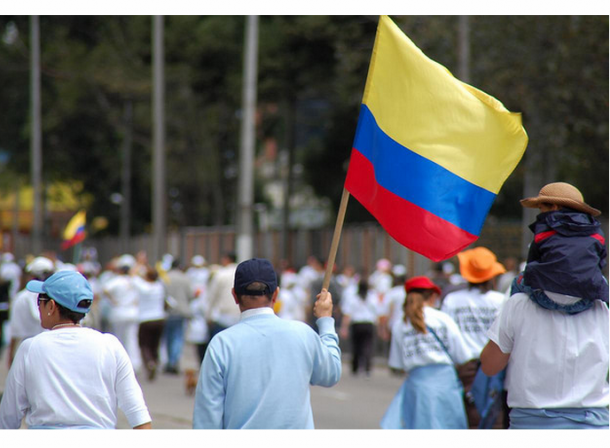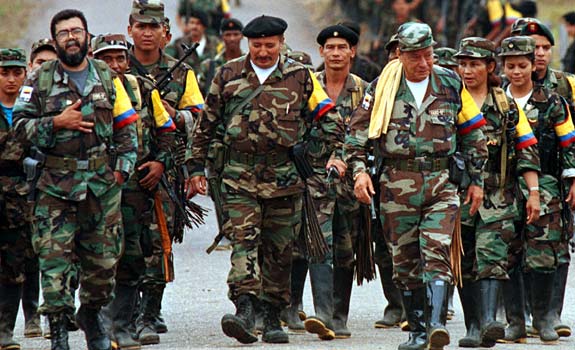Five Issues Troubling the Ongoing Colombia – FARC Peace Talks

“We didn’t come here to waste time.” A defensive Iván Márquez, spokesman of the decades-old Colombian FARC revolutionary group uttered these words on January 31, during the latest round of peace talks between Bogotá and the insurgent movement.[1] Now, some media outlets routinely have latched onto the automatic narrative that the negotiations are floundering in Havana. As such, a general cynicism surrounds the latest attempt at peace, as well as the likelihood of a substantial agreement before the November deadline of this year. Despite the formidable odds that are at stake, Márquez has insisted that the guerilla movement remains committed “toward ending the conflict and reaching peace.” [2]
Much of the Colombian population certainly wants to take Márquez (and indeed President Juan Manuel Santos) seriously in their attempts to rectify a violent and bloody civil war that has intermittently rocked the country with waves of murderous kidnappings and drug trafficking encounters. In addition, to host Cuba’s participation in the latest round, other Latin American countries across ideological spectrum are committed to a similar goal. Center-right Chile has representatives at the negotiation table, joining officials from socialist Venezuela.[3] Yet, even though several months remain before the government’s deadline, potentially crippling problems have emerged on both sides of what has been an endless war that continues to undermine the functionality of the peace agreements:
1. The ceasefire that wasn’t
The closest the two sides have gotten to any achievement of a peace accord occurred during FARC’s two-month unilateral ceasefire that expired on January 20.[4] At the time, those not jaded by fifty years of conflict were able to remark positively that FARC was taking Santos and the peace process seriously, especially since the group vowed to stop kidnappings of each other over one year ago. However, the New Rainbow Corporation Armed Conflict Observatory, a Colombian think tank, identified at least 41 skirmishes between the two forces that materialized in the supposed time frame of nonviolence.[5] Reports place the instigation and culpability of the violence on both parties. Also concerning was FARC’s abandonment of its promise to cease kidnapping by describing a recent capture of three officials as the taking of “prisoners of war.”[6] The Colombian military, for its part, has identified 52 incidents of the FARC violating its supposed ceasefire.[7] Yet FARC has defended this violence as “self-defense,” using former president Santos’s absolutist probabilities (that is, full agreement or nothing) approach to the talks to paint the Colombian government (and not the FARC) as the primary aggressor.
2. Colombia has shown little interest in wanting to compromise
FARC has returned to its early agrarian ideological views in the latest round of its public rumblings, advocating for the greater allocation of unused land to small-scale farmers and the reformulating of existing contracts with multinationals to favor local populations and the environment.[8] However, the Colombian government has shown little interest in addressing the fundamentals of these claims. Bogotá has not discussed the widespread inequality to be found amongst landowners, partly because the Santos administration has called for more development and deregulation in the Colombian economy.[9] This reality helps account for the troublesome state of land ownership in the country. Over half of all land in rural Colombia is owned by just over one percent of the population, according to the United Nations Development Program.[10] While Santos continues to answer to the occasional grumbles in his military, his absolutist approach ignores the merit of several FARC proposals that should have achieved merit on the negotiation table.
For example, FARC has proposed a 10-point plan for talks; its proposals include everything from reevaluating Bogotá’s Free Trade Agreements to advocating for more federal investment in agricultural sciences. There are legitimate points and genuine merit to the justice backing most of FARC’s proposals, yet Colombian officials have dismissed the group’s demands as too “utopian” and “radical.” (The full list of FARC’s demands can be found here.) A more moderate government like that of ex-President Andrés Pastrana’s might have entertained some of FARC’s demands, but Santos won the presidency largely for his tough promise to further crack down on the country’s insurgency problem. His decision to engage the FARC in peace talks represents a drastic departure from his hardline predecessor Alvaro Uribe’s military-oriented policy. With political implications swirling around his decision to enter the talks, Santos risks eroding his limited credibility if he is seen as compromising too much.
3. The recent examples of violence
For FARC to have any chance at maintaining credibility at the negotiation table, it will need to gain at least limited support from the public and the national press. Yet, if the group’s recent accusations hold any weight, these two sectors are unlikely to overly sympathize with the revolutionaries’ actions. FARC leaders have criticized several media outlets of bias, including Colombia’s popular radio station Caracol. This is largely due to what the FARC claims is skewed coverage focusing incessantly on the group’s history of violence and violent incidents. While the merits of such a charge are difficult to quantify, it is true that recent reports on the peace talks have centered by and large on a swath of violence in the aftermath of the FARC’s call for a “cease-fire.” Rather than discussions on the country’s 10.3 percent unemployment rate[11], debates on the causes of its high .55 Gini coefficient (an indicator used to measure income inequality)[12], or discussions on why more than one-third of its citizens live in poverty [13], Colombians are more likely to hear the various attacks associated with the war. Last week alone, FARC admitted responsibility for the deaths of at least five policemen, whose killings may have, at least territoriality clouded any coverage of the peace talks’ success. Equally troubling are reports that the Colombian military has increased its offensive posture; the army’s latest operation resulted in the death of six FARC members near the border with Venezuela. [14] While FARC may not control how the media reports on the peace talks, it should limit how many attacks it instigates or permanently risk losing a public already turned off by such bellicose actions.

4. FARC’s evasive media campaign
FARC understands and recognizes that it must win over a hostile public––the same people for whom the group claims to war against. To do so, the group is likely to rely on Tanja Nijmeijer, a 34 year-old Dutch expatriate who first came to Colombia to teach English. Nijmeijer has already attracted attention for her Spanish mastery and could be the most well known member of the rebel group. (The Colombian government feared her influence so much that she was originally denied a seat at the negotiation table.) Yet Nijmeijer has done little in her public forums to advance the group’s cause. When journalists confronted her with legitimate questions on her role in the violence, her responses were incredibly defensive. According to the BBC, the woman fired off at one point, “I thought I was in an interview, not a trial.”[15] For the countless Colombians whose patience has worn thin with the revolutionaries, Nijmeijer’s evasiveness could be perceived as disconnected, or even callous to the innumerable families affected by the violence.
In addition to becoming more transparent, FARC should make an effort to shift the discussion to Colombia’s numerous economic problems. For his part, Márquez has appeared to show signs of moving in this direction. On February 9, he specifically called for the government to “settle its historic debt,” with rural farmers, and unveiled a new demand of nine million hectares of land based on a 2011 recommendation from the United Nations.[16] The move was a good start in pivoting the narrative more towards FARC’s agenda for Colombia and less on its violent and frigid past.
5. The Uribe question
Finally, Santos’s predecessor and former booster Alvaro Uribe has chosen to assault the negotiations from every direction, doing little to aid their progress. Uribe most recently pummeled the government for negotiating in the wake of the latest “prisoner of war” fiasco, according to Latin News. As another example, Uribe spent all 90 minutes of a recent speech attacking Santos’s economic and defense positions.[17] In the wake of the country’s upcoming elections in 2014, it is hard to interpret Uribe’s constant snarls and repeated barbs as anything other than an attempt to delegitimize Santos in order to benefit the ex-president’s newly formed right wing party, the Centro Democrático. While Uribe may see gains for his cause, if he continues to try to torpedo the current peace talks, there is little pay-off for such a route, for the Colombian rural population is especially primed to suffer from further impediments to the process. Uribe has certainly lost much standing over the recent years, but as his criticisms grow louder and more prolonged, they could warrant some negative attention from Santos. [18]
Amidst these negotiations, it is helpful to mention that Colombia has demobilized rebel groups in the past with mixed results. While Bogotá negotiated with the M-19 guerilla movement to demobilize its forces in the late 1980s, death squads assassinated many of the group’s political candidates upon their reintegration into public life. [19] The country also has suffered amidst charges of corruption and illegal collaboration with the paramilitary AUC during its reintegration process.[20] As the last major guerilla group in Latin America, FARC has proven itself to be adept, crafty, and ultimately resourceful as it nears the half-century mark of its operations. In this critical stage of talks, both Santos and the FARC should do everything in their power to assert that 2013 will finally sew the elusive strands of peace into a Colombian fabric that best accounts for the interests of the country’s people.
Trent Boultinghouse, Research Fellow at the Council on Hemispheric Affairs
Please accept this article as a free contribution from COHA, but if re-posting, please afford authorial and institutional attribution. Exclusive rights can be negotiated.
For additional news/analysis on Latin America please go to: www.LatinNews.com
References
[1] William Neuman, “Kidnappings Imperil Talks With Rebels in Colombia,” New York Times, February 2, 2013. http://www.nytimes.com/2013/02/03/world/americas/colombia-kidnappings-cast-pall-over-talks-with-farc.html?_r=1&
[2] Helen Murphy, “Colombia’s FARC rebels deny crisis in peace talks,” Reuters, February 4, 2013. http://uk.reuters.com/article/2013/02/04/uk-colombia-rebels-crisis-idUKBRE9130O620130204
[3] Jeff Franks, “FARC Declares Ceasefire Amid Colombia Peace Talks,” Huffington Post, November 19, 2012. http://www.huffingtonpost.com/2012/11/19/farc-declares-ceasefire-_n_2158751.html
[4] Jeff Franks, “Colombia’s FARC rebels end ceasefire,” Reuters, January 20, 2013. http://www.reuters.com/article/2013/01/20/us-colombia-rebels-talks-idUSBRE90J08I20130120
[5] Emily Schmitz, “Peace Negotiations Re-open After Expired Cease-fire,” Fellowship of Reconciliation, January 31, 2013. http://forusa.org/blogs/for-colombia/peace-negotiations-re-open-after-expired-cease-fire/11781
[6] “FARC: Capture police are prisoners of war,” UPI, January 30, 2013. http://www.upi.com/Top_News/World-News/2013/01/30/FARC-Capture-police-are-prisoners-of-war/UPI-97551359563959/
[7]“Colombia refuses to extend FARC ceasefire,” Al-Jazeera, January 20, 2013. http://www.aljazeera.com/news/americas/2013/01/201312016575695697.html
[8]Emily Schmitz, “Peace Negotiations Re-open After Expired Cease-fire,” Fellowship of Reconciliation, January 31, 2013. http://forusa.org/blogs/for-colombia/peace-negotiations-re-open-after-expired-cease-fire/11781
[9] Carolina Ramirez, “Colombia Brings Civil Society, Land Reform Into Peace Talks,” World Politics Review, January 14, 2013. http://www.worldpoliticsreview.com/articles/12621/colombia-brings-civil-society-land-reform-into-peace-talks
[10] Alessandro Rampietti, “Colombia land reform key to peace,” Al-Jazeera, December 16, 2012. http://blogs.aljazeera.com/blog/americas/colombia-land-reform-key-peace
[11] “Colombia,” The CIA World Factbook, last updated February 5, 2013. https://www.cia.gov/library/publications/the-world-factbook/geos/co.html
[12] “GINI index,” The World Bank, http://data.worldbank.org/indicator/SI.POV.GINI/
[13] “Population below poverty line (%) – Colombia,” IndexMundi, http://www.indexmundi.com/g/g.aspx?c=co&v=69
[14] “February 1, 2013 Daily Briefing,” Latin News, February 1, 2013. http://latinnews.com/component/k2/item/54907.html?period=February+2013&archive=3&cat_id=790670%3Acolombias-eln-kidnaps-two-foreigners&Itemid=6
[15] Sarah Rainsford, “Tanja Nijmeijer: Dutch Farc rebel at peace talks,” BBC News, January 30, 2013. http://www.bbc.co.uk/news/world-latin-america-21237362
[16]Adriaan Alsema, “FARC announces new demands for Colombia agrarian reforms,” Colombia Reports, February 10, 2013. http://colombiareports.com/colombia-news/peace-talks/28095-farc-publishes-new-demands-for-colombia-agrarian-reform.html
[17] “February 1, 2013 Daily Briefing,” Latin News, February 1, 2013. http://latinnews.com/component/k2/item/54907.html?period=February+2013&archive=3&cat_id=790670
[18] “February 1, 2013 Daily Briefing,” Latin News, February 1, 2013. http://latinnews.com/component/k2/item/54907.html?period=February+2013&archive=3&cat_id=790670%3Acolombias-eln-kidnaps-two-foreigners&Itemid=6
[19] United States Bureau of Citizenship and Immigration Services, Colombia: Information on the Former Guerrilla Group M-19, 25 March 2003, COL03002.OGC, available at: http://www.unhcr.org/refworld/docid/414eee264.html
[20] Immigration and Refugee Board of Canada, Colombia: The situation and demobilization of right-wing paramilitary groups and, in particular, the United Self-Defence Forces of Colombia (Autodefensas Unidas de Colombia, AUC); the reintegration of demobilized combatants, government measures, assistance offered, and the results observed to date (2006 – February 2008), 15 April 2008, COL102780.FE, available at: http://www.unhcr.org/refworld/docid/4829b55d23.html [accessed 6 February 2013]

